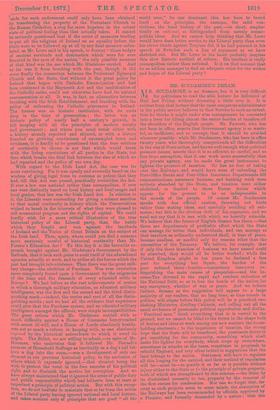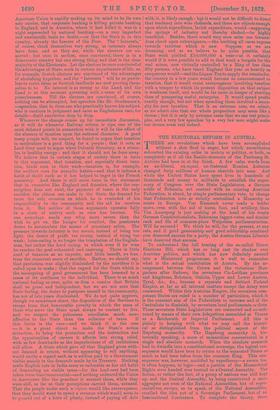MR. SCITDAMORE'S DREAM.
SCITDAMORE is no dreamer, but it is very difficult for politicians to read the able lecture he delivered at Hull last Friday without dreaming a little over it. It is evident from that lecture that the most competent administrator in the public service believes in that Service to such an extent, that he thinks it might under wise management be converted into a lever for lifting almost the entire burden of taxation off the shoulders of the English people. Mr. Fawcett, who has not been in office, asserts that Government agency is so waste- ful, so inefficient, and so corrupt, that it should be avoided wherever possible ; while Mr. Soudamore, who has been in office twenty years, who thoroughly comprehends all the difficulties in the way of State action, and knows well enough what political pressure means, asserts that it is so efficient, so careful, and so free from corruption, that it can work more successfully than any private agency, can be made the great instrument to lighten the pressure of taxation. He has no fear of taking over the Railways, and would have none of extending the Post-Office Banks and Post-Office Insurance Departments till communications, assurance business, and banking work were entirely absorbed by the State, and taxation were either abolished, or limited to those Excise duties which appear for the present to be so indispensable to the morals of the people. Of course Mr. Scudamore speaks with due official caution, throwing out hints rather than stating ideas, and carefully avoiding all esti- mates; but this is the obvious drift of his argument, and we need not say that it is one with which we heartily coincide. We believe that the future of English finance lies there,—that there are departments of profitable effort which the State can manage far better than individuals, and can manage so that taxation as ordinarily understood shall, in time of peace, become needless, or needful only for reasons other than the necessities of the Treasury. We believe, for example, that if only the three branches of business we have named could be absorbed, they would all be better worked ; while the United Kingdom might in ten years be declared a free port for everything but liquor, the burden of the poor reduced three - fourths —compulsory insurance ex- tinguishing the main causes of pauperism—and the In- come-Tax devoted to the rapid and resolute reduction of the National Debt, so as to free the hands of the nation for any emergency, whether of war or peace. And we believe further, dreamy as the suggestion will appear to a large majority of our readers, that no long time, as time counts in politics, will elapse before this policy will be a practical one shaking Ministries, dividing Cabinets, and calling out all the usual evidences of passionate political approbation and dislike. " Practical men " think everything that is is rooted to the ground, but we cannot be blind to the forces in the shape both of desires and ideas at work among our new masters, the house- holding electorate ; to the impatience of taxation, the strong hope that the State will be beneficent, the passionate desire to get something for the community, something which shall make life lighter for everybody, which crops up everywhere, sometimes in attacks on the taxes, sometimes in proposals to rebuild England, and very often indeed in suggestions that the land belongs to the nation. Statesmen will have to regulate all this longing for the untried, and their method of regulation will be—must be—to gratify it so far as is possible without injury either to the State or to the principle of private property, both of which are strengthened by this scheme,—the State by its diminished necessity to tax, property by the removal of the first excuse for confiscation. Nor can we forget that, far away as such projects seem to some minds, the absorption of the Railways has been recommended by officials, approved by a Premier, and formally demanded by a nation ; that the American Union is rapidly making up its mind to be its own sole carrier, that corporate banking is killing private banking in England, and in America, where it had killed it, was in a night superseded by national banking—on a very imperfect and unscientific basis no doubt,—or that the State is, in this country, already the Insurer of the Poor. The " Interests," of course, think themselves very strong, as interests always have done, and so they are, while the electors are un- moved ; but once in motion, once convinced, there is in a democratic country but one strong thing, and that is the clear majority of the Electorate. Let the electors be once convinced of the advantages of State work in certain departments of life, as, for example, Scotch electors are convinced of the advantages of abolishing hypothec, and the "Interests " will be as power- less to resist them as Scottish landlords are now proving them- selves to be. No interest is so strong as the Land, and the Land is at this moment quivering with a sense of its own powerlessness. Till the electors are convinced, of course, nothing can be attempted, but speeches like Mr. Scudamore's, —speeches, that is, from one who practically knows his subject, who is cautious in judgment and cares as Englishmen care, for details—distil conviction drop by drop.
Whenever the change comes up for immediate discussion, as it will do whenever Railway reform is ripe, one of the most debated points in connection with it will be the effect of the absence of taxation upon the national character. A good many people will, we suspect, be found to argue that taxation in moderation is a good thing for a people ; that it acts, as Lord Grey used to argue when Colonial Secretary, as a stimu- lus to healthy energy ; and that it should not be done away.
We believe that in certain stages of society there is force in this argument, that taxation, and especially direct taxa- tion, binds men to their work—taxation is, for example, the swiftest cure for nomadic habits—and that it induces a habit of thrift such as it has helped to beget in the French peasantry. And there is still more force in the statement that in countries like England and America, where the con- scription does not exist, the payment of taxes is the only sacrifice the citizen can make to the State, the demand for taxes the only occasion on which he is reminded of his responsibility to the community and the aid he receives from it. But neither of these arguments operates fully in a state of society such as ours has become. No one nowadays needs any whip more severe than the wish to get on, the hunger for comfort, the passionate desire to accumulate the means of pecuniary safety. The pressure towards industry is too severe, instead of being too light, the desire of profit too strong, instead of being too weak; lotus-eating is no longer the temptation of the English- man, but rather the hard racing, in which even if he wins he reaches the goal exhausted and unstrung. There is little need of taxation as an impulse, and little benefit, we fear, from the recurrent sense of sacrifice. Rather, we should say, that patriotism was slightly diminished by the sacrifices it is called upon to make ; that the regard for the State which is the mainspring of good government has been lessened by a sense of its costliness to the individual. There is as much national feeling as ever, quite as firm a resolve that Britain shall be great and independent, but we are not sure that State feeling, the desire to postpone oneself to the community, has not of late years diminished. We do not quite approve, though we sometimes share, the disposition of the Services to escape from that honourable poverty in which the mass of those who serve the State must always be content to live, and we suspect the policeman conciliates much more affection to the State than the collector of taxes. If this latter is the case—and we think it is the case — it is a great object to make the State's action attractive, to bring the protection and the instruction and the opportunities of careers it affords into strong relief, with as few drawbacks as the imperfections of all institutions will allow. A State which gave all that England gives with- out demand in return, without appearing to sell anything, would excite a regard such as is seldom paid to a Government visible mainly in the demands made by its Treasury. Nothing made English rule in India seem so endurable as her old habit of demanding no visible taxes—for the land-rent had been taken from time immemorial—and nothing endeared the Union to Americans like the grandeur it secured them, while they were still, as far as their perceptions carried them, untaxed. That the people under such a regime would like extravagance, that they would want to spend a revenue which would seem to be poured out of a horn of plenty, instead of paying off debt with it, is likely enough ; kit it would not be difficult to direct that tendency into wise channels, and there are objects enough upon which expenditure, lavish expenditure, would—supposing the springs of industry not thereby choked—be highly beneficial. Besides, there would very soon arise one tremen- dous check upon extravagance,—the loathing all races express towards taxation which is new. Suppose, as we are dreaming, and as we believe to be quite possible, that State work yielded £40,000,000 a year—as it certainly would if it were possible to add to that work a bargain for the coal mines, now virtually controlled by a Ring of less than fifty persons, who have taxed England this year as heavily as conquerors would—and the Liquor Taxto supply the remainder, the country in a few years would become so unaccustomed to taxation, that it would resist extravagance involving taxation with a temper to which its present disposition on that subject is weakness itself, and would be far more in danger of starving than of pampering useful enterprise. It would spend profits readily enough, but not when spending them involved a neces- sity for new taxation. That is an extreme case, we admit, as we admit also that our whole proposition may seem like a dream ; but it is only by extreme cases that we can test princi- ples, and a very few speeches by a very few men might make our dream seem real indeed.







































 Previous page
Previous page